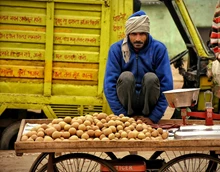
G-20 Council's Second Disaster Risk Reduction Working Group (DRRWG) meeting concluded in Mumbai today, highlighting the significance of Disaster Resilient Infrastructure and Financing for Disaster Risk Reduction as the central themes for discussion.
During the meeting, the delegates emphasized the need for an institutional framework that supports investments in infrastructure projects while avoiding fragmentation. They recognized the importance of promoting the execution of such projects and recommended their encouragement within the national legal framework of G-20 countries. Additionally, the role of social protection systems in safeguarding vulnerable population groups from the adverse effects of disasters was extensively discussed.
The exchange of good practices and case studies among the G-20 countries was another crucial topic on the agenda. Kamal Kishore, the DRRWG Chair (India) and Member-Secretary of the National Disaster Management Authority (NDMA), offered support by collating relevant data and co-developing a compendium in areas such as Early Warning and Early Action, Resilient Infrastructure, and Financing for Disaster Risk Reduction.
The meeting witnessed the participation of government delegates, DRR specialists, UN agency officials, representatives of community-based organizations, multilateral development banks and financial groups, as well as research organizations. The Coalition for Disaster Resilient Infrastructure (CDRI), an important stakeholder, was also present during the deliberations.
Concluding the meeting, a side event on Eco-Based Approaches for Disaster Risk Reduction was organized by NDMA in collaboration with knowledge partners like the United Nations Office for Disaster Risk Reduction (UNDRR), UN Major Group on Children and Young People, UNEP, and others. Furthermore, a Round Table with Private Sectors focusing on Financing Disaster Risk Reduction attracted significant attendance during the 2nd DRRWG meeting in Mumbai. The discussion aimed to understand the challenges faced by the private sector in finding the DRR space lucrative.
The technical sessions of the meeting revolved around developing a roadmap for the DRRWG over the next three years. The Indian Presidency stressed the importance of instilling ownership among the troika countries and South Africa to carry this initiative forward. The goal is to mainstream disaster risk reduction in the policy space and utilize financing instruments and mechanisms to shift the paradigm from disaster response to anticipatory action and risk reduction.
On the first day of the DRRWG meeting, discussions primarily focused on ‘Financing for Disaster Risk Reduction.’ The delegates participated in a day-long side event divided into sub-themes related to the priority. Various aspects were explored, including strategies for building resilient cities, financing urban infrastructure, and developing future-ready urban infrastructure.
The meeting also addressed important topics such as incentivizing private investments, sectoral interventions, insurance-related mechanisms for reconstruction, and social protection mechanisms. Experts from key international organizations, including UNDP, OECD, IMF, ADB, and EBRD, actively participated in this side event.
(Source: PIB)











